The Bridge
In the face of DEI backlash, belonging plays a key role to future success
Diversity, equity, and inclusion (DEI) efforts in workplaces soared, but now they’re waning. The author’s research touts “belonging” as crucial, yet contested.
Last Updated on September 21, 2024 by Daily News Staff
Andrea Carter, Adler University
Diversity, equity and inclusion efforts have become increasingly visible in U.S. workplaces, especially over the past five years. However, DEI has recently come under attack, with companies scaling back their DEI plans.
As a professor of organizational psychology, I believe businesses should refine rather than abandon these efforts. Introducing a powerful concept, “belonging,” could hold the key.
Although people mistakenly use “belonging” and “inclusion” interchangeably, their differences matter a lot – and can have a significant impact on employee satisfaction and organizational success.
What DEI is and why it’s struggling
Diversity initiatives have a long history in American workplaces, but it’s only recently that “DEI” has become a buzzword. DEI refers to policies and initiatives implemented by organizations to ensure fair treatment of and full participation by all people.
Adoption of formal DEI programs has seen significant growth. In 2019, around 64% of organizations had some form of DEI initiative. By 2023, this rose to 89%, demonstrating a clear upward trend.
Research shows that companies with diverse teams are 70% more likely to capture new markets and are 87% better at making decisions. Additionally, 85% of CEOs report diverse workforces improving profitability. Despite this, a trend of businesses and schools significantly or completely eradicating their DEI initiatives has become prevalent in 2024.
What happened? While external factors contributed to the backlash, including political pressure and a changed legal environment, research suggests that problems with how DEI is conceptualized and practiced also bear a fair share of the blame.
Misunderstanding DEI
While diversity and inclusion are often well-intentioned, many organizations that approached change initiatives solely through diversity metrics have failed. Effective DEI strategy focuses on learning and development, mentorship, and allyship, extending beyond race and gender. The challenge comes from narrow views of DEI, driving oversimplifications and zero-sum thinking.
For example, people have multiple intersecting identities, with complex traits that often depend on social context. But some DEI efforts ignore that complexity, reducing employees to a single category, such as gender, race, age or disability status. That leaves people, regardless of whether they feel included in “ingroups” or “outgroups,” feeling diminished.
Similarly, research shows that people’s actions and opportunities are strongly influenced by their environment. But too often, DEI efforts place the responsibility for growth entirely on individuals. That actually reinforces people’s biases because group dynamics and social structures shape collective behaviors.
When models fail to distribute accountability and responsibility effectively, collective behavior will uphold toxic environments.
To be fair, not all organizations have fallen into these traps. Those with leaders that adopted a more contemporary understanding of power and bias have developed more effective strategies for employees to thrive.
My research suggests that for DEI initiatives to succeed, respect and fairness must be present. These requirements are rooted in the foundations of belonging.
DEI’s evolution: Integrating belonging for lasting impact
While belonging is related to inclusion, research shows it’s much more than just a synonym.
Inclusion may focus on being seen, accepted and valued within a team or community. Belonging goes deeper, involving a genuine sense of connection and identity within a group.
To truly experience belonging, it’s not enough to feel included; my research shows that five critical indicators must also be present.
These elements ensure that individuals feel a deep, meaningful attachment to the group, which inclusion alone cannot fully achieve. This distinction underscores that belonging is a unique and essential experience, distinct from inclusion, and critical for fostering a truly cohesive and supportive environment.
So what are the five indicators of belonging? They are comfort, connection, contribution, psychological safety and well-being, and all of them can be measured.
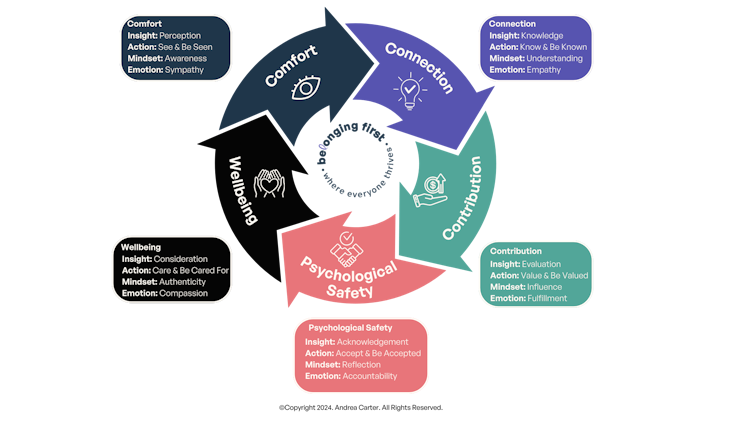
When an environment is high in each of the five indicators, and the measured gap between the ingroup and outgroup is low, it suggests an environment where responsibility for creating opportunities to thrive are shared and balanced. Let’s unpack these concepts:
- Comfort. When an organization is high in comfort, people feel seen for who they are. This requires them to accept that others have complex, sometimes contradictory identities, and to adopt a mindset of awareness. Perhaps counterintuitively, achieving comfort requires being a little uncomfortable, too. That’s because respectfully seeing and being seen means acknowledging other people’s discomfort.
- Connection. Connection is the need to be known and trusted. For an organization to score high on connection, people will be aligned on values and goals. Connection creates a shared sense of responsibility and accountability. This shared responsibility is a foundation for empathy, since trust and fairness are born from understanding and empathizing with the social and emotional needs of others.
- Contribution. An organization high in contribution values its members for the unique and diverse attributes they bring to the table. In belonging environments, an individual’s contribution is evaluated through curiosity and openness; ideas and perspectives are shared to influence and challenge the status quo, driving innovation and creativity. When someone is genuinely acknowledged for their contributions, both they and their team feel fulfilled.
- Psychological safety. When a person is genuinely accepted into a group, making a mistake or even failing is seen as a chance to learn and grow, not an opportunity to shame, blame or exclude. This is the essence of psychological safety. In cases where people’s perspectives are dramatically different, psychological safety requires everyone to reflect and put themselves in the shoes of the other to respect their differences and be accountable for behavior.
- Well-being. In an organization high in well-being, members’ experiences are considered and cared for. This requires everyone to share responsibility for caring for individuals, groups, teams and the organization as a whole, each with their authentic needs.
Belonging, based on my research, is not just a buzzword; it’s the bedrock of a thriving, innovative workplace. Leaders who understand this and take action can enhance individual well-being while unlocking the full potential of their teams.
By committing to building environments where the indicators of belonging are prioritized, leaders can ignite passion, loyalty and excellence in their workplaces.
Andrea Carter, Adjunct Faculty in Industrial and Organizational Psychology, Adler University
This article is republished from The Conversation under a Creative Commons license. Read the original article.
The Bridge is a section of the STM Daily News Blog meant for diversity, offering real news stories about bona fide community efforts to perpetuate a greater good. The purpose of The Bridge is to connect the divides that separate us, fostering understanding and empathy among different groups. By highlighting positive initiatives and inspirational actions, The Bridge aims to create a sense of unity and shared purpose. This section brings to light stories of individuals and organizations working tirelessly to promote inclusivity, equality, and mutual respect. Through these narratives, readers are encouraged to appreciate the richness of diverse perspectives and to participate actively in building stronger, more cohesive communities.
https://stmdailynews.com/category/the-bridge
Discover more from Daily News
Subscribe to get the latest posts sent to your email.
The Knowledge
How a 22-year-old George Washington learned how to lead, from a series of mistakes in the Pennsylvania wilderness
This Presidents Day, I’ve been thinking about George Washington − not at his finest hour, but possibly at his worst.

Christopher Magra, University of Tennessee
This Presidents Day, I’ve been thinking about George Washington − not at his finest hour, but possibly at his worst.
In 1754, a 22-year-old Washington marched into the wilderness surrounding Pittsburgh with more ambition than sense. He volunteered to travel to the Ohio Valley on a mission to deliver a letter from Robert Dinwiddie, governor of Virginia, to the commander of French troops in the Ohio territory. This military mission sparked an international war, cost him his first command and taught him lessons that would shape the American Revolution.
As a professor of early American history who has written two books on the American Revolution, I’ve learned that Washington’s time spent in the Fort Duquesne area taught him valuable lessons about frontier warfare, international diplomacy and personal resilience.
The mission to expel the French
In 1753, Dinwiddie decided to expel French fur trappers and military forces from the strategic confluence of three mighty waterways that crisscrossed the interior of the continent: the Allegheny, Monongahela and Ohio rivers. This confluence is where downtown Pittsburgh now stands, but at the time it was wilderness.
King George II authorized Dinwiddie to use force, if necessary, to secure lands that Virginia was claiming as its own.
As a major in the Virginia provincial militia, Washington wanted the assignment to deliver Dinwiddie’s demand that the French retreat. He believe the assignment would secure him a British army commission.
Washington received his marching orders on Oct. 31, 1753. He traveled to Fort Le Boeuf in northwestern Pennsylvania and returned a month later with a polite but firm “no” from the French.
Dinwiddie promoted Washington from major to lieutenant colonel and ordered him to return to the Ohio River Valley in April 1754 with 160 men. Washington quickly learned that French forces of about 500 men had already constructed the formidable Fort Duquesne at the forks of the Ohio. It was at this point that he faced his first major test as a military leader. Instead of falling back to gather more substantial reinforcements, he pushed forward. This decision reflected an aggressive, perhaps naive, brand of leadership characterized by a desire for action over caution.
Washington’s initial confidence was high. He famously wrote to his brother that there was “something charming” in the sound of whistling bullets.
The Jumonville affair and an international crisis
Perhaps the most controversial moment of Washington’s early leadership occurred on May 28, 1754, about 40 miles south of Fort Duquesne. Guided by the Seneca leader Tanacharison – known as the “Half King” – and 12 Seneca warriors, Washington and his detachment of 40 militiamen ambushed a party of 35 French Canadian militiamen led by Ensign Joseph Coulon de Jumonville. The Jumonville affair lasted only 15 minutes, but its repercussions were global.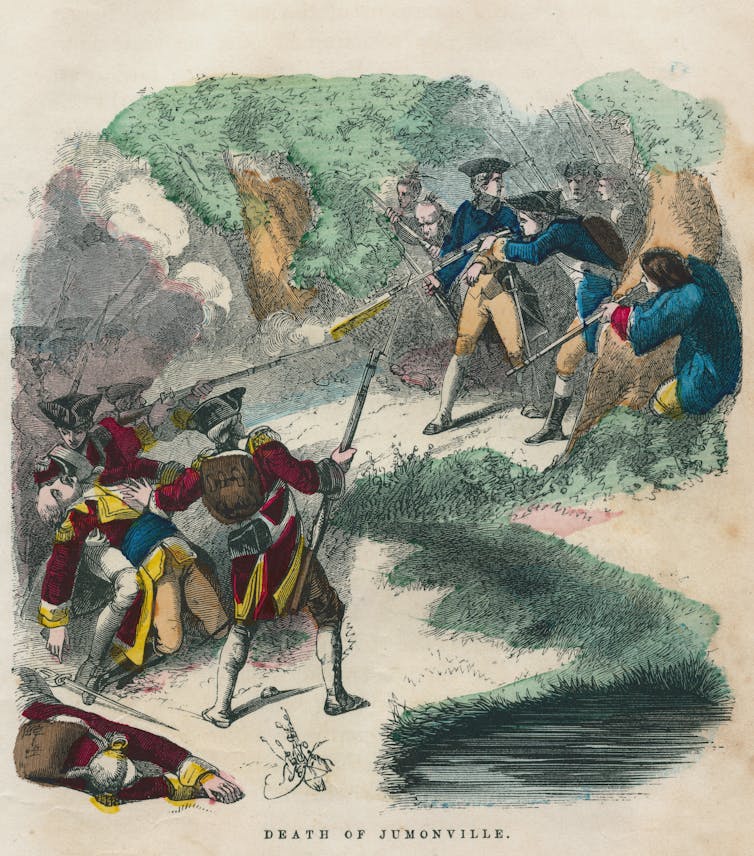
Ten of the French, including Jumonville, were killed. Washington’s inability to control his Native American allies – the Seneca warriors executed Jumonville – exposed a critical gap in his early leadership. He lacked the ability to manage the volatile intercultural alliances necessary for frontier warfare.
Washington also allowed one enemy soldier to escape to warn Fort Duquesne. This skirmish effectively ignited the French and Indian War, and Washington found himself at the center of a burgeoning international crisis.
Defeat at Fort Necessity
Washington then made the fateful decision to dig in and call for reinforcements instead of retreating in the face of inevitable French retaliation. Reinforcements arrived: 200 Virginia militiamen and 100 British regulars. They brought news from Dinwiddie: congratulations on Washington’s victory and his promotion to colonel.
His inexperience showed in his design of Fort Necessity. He positioned the small, circular palisade in a meadow depression, where surrounding wooded high ground allowed enemy marksmen to fire down with impunity. Worse still, Tanacharison, disillusioned with Washington’s leadership and the British failure to follow through with promised support, had already departed with his warriors weeks earlier. When the French and their Native American allies finally attacked on July 3, heavy rains flooded the shallow trenches, soaking gunpowder and leaving Washington’s men vulnerable inside their poorly designed fortification.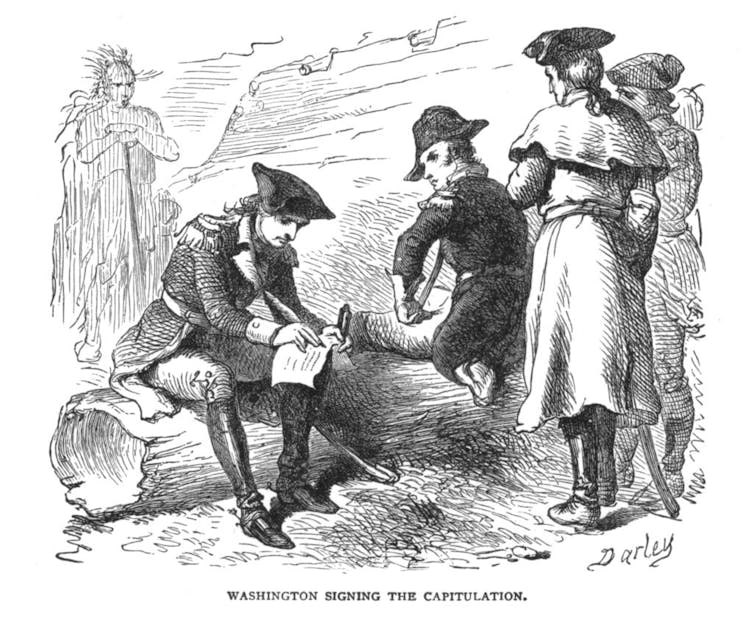
The battle of Fort Necessity was a grueling, daylong engagement in the mud and rain. Approximately 700 French and Native American allies surrounded the combined force of 460 Virginian militiamen and British regulars. Despite being outnumbered and outmaneuvered, Washington maintained order among his demoralized troops. When French commander Louis Coulon de Villiers – Jumonville’s brother – offered a truce, Washington faced the most humbling moment of his young life: the necessity of surrender. His decision to capitulate was a pragmatic act of leadership that prioritized the survival of his men over personal honor.
The surrender also included a stinging lesson in the nuances of diplomacy. Because Washington could not read French, he signed a document that used the word “l’assassinat,” which translates to “assassination,” to describe Jumonville’s death. This inadvertent admission that he had ordered the assassination of a French diplomat became propaganda for the French, teaching Washington the vital importance of optics in international relations.
Lessons that forged a leader
The 1754 campaign ended in a full retreat to Virginia, and Washington resigned his commission shortly thereafter. Yet, this period was essential in transforming Washington from a man seeking personal glory into one who understood the weight of responsibility.
He learned that leadership required more than courage – it demanded understanding of terrain, cultural awareness of allies and enemies, and political acumen. The strategic importance of the Ohio River Valley, a gateway to the continental interior and vast fur-trading networks, made these lessons all the more significant.
Ultimately, the hard lessons Washington learned at the threshold of Fort Duquesne in 1754 provided the foundational experience for his later role as commander in chief of the Continental Army. The decisions he made in Pennsylvania and the Ohio wilderness, including the impulsive attack, the poor choice of defensive ground and the diplomatic oversight, were the very errors he would spend the rest of his military career correcting.
Though he did not capture Fort Duquesne in 1754, the young George Washington left the woods of Pennsylvania with a far more valuable prize: the tempered, resilient spirit of a leader who had learned from his mistakes.
Christopher Magra, Professor of American History, University of Tennessee
This article is republished from The Conversation under a Creative Commons license. Read the original article.
Dive into “The Knowledge,” where curiosity meets clarity. This playlist, in collaboration with STMDailyNews.com, is designed for viewers who value historical accuracy and insightful learning. Our short videos, ranging from 30 seconds to a minute and a half, make complex subjects easy to grasp in no time. Covering everything from historical events to contemporary processes and entertainment, “The Knowledge” bridges the past with the present. In a world where information is abundant yet often misused, our series aims to guide you through the noise, preserving vital knowledge and truths that shape our lives today. Perfect for curious minds eager to discover the ‘why’ and ‘how’ of everything around us. Subscribe and join in as we explore the facts that matter. https://stmdailynews.com/the-knowledge/
Discover more from Daily News
Subscribe to get the latest posts sent to your email.
Urbanism
The Building That Proved Los Angeles Could Go Vertical
Los Angeles once banned skyscrapers, yet City Hall broke the height limit and proved high-rise buildings could be engineered safely in an earthquake zone.

How City Hall Quietly Undermined LA’s Own Height Limits
The Knowledge Series | STM Daily News
For more than half a century, Los Angeles enforced one of the strictest building height limits in the United States. Beginning in 1905, most buildings were capped at 150 feet, shaping a city that grew outward rather than upward.
The goal was clear: avoid the congestion, shadows, and fire dangers associated with dense Eastern cities. Los Angeles sold itself as open, sunlit, and horizontal — a place where growth spread across land, not into the sky.
And yet, in 1928, Los Angeles City Hall rose to 454 feet, towering over the city like a contradiction in concrete.
It wasn’t built to spark a commercial skyscraper boom.
But it ended up proving that Los Angeles could safely build one.
A Rule Designed to Prevent a Manhattan-Style City
The original height restriction was rooted in early 20th-century fears:
- Limited firefighting capabilities
- Concerns over blocked sunlight and airflow
- Anxiety about congestion and overcrowding
- A strong desire not to resemble New York or Chicago
Los Angeles wanted prosperity — just not vertical density.
The height cap reinforced a development model where:
- Office districts stayed low-rise
- Growth moved outward
- Automobiles became essential
- Downtown never consolidated into a dense core
This philosophy held firm even as other American cities raced upward.
Why City Hall Was Never Meant to Change the Rules
City Hall was intentionally exempt from the height limit because the law applied primarily to private commercial buildings, not civic monuments.
But city leaders were explicit about one thing:
City Hall was not a precedent.
It was designed to:
- Serve as a symbolic seat of government
- Stand alone as a civic landmark
- Represent stability, authority, and modern governance
- Avoid competing with private office buildings
In effect, Los Angeles wanted a skyline icon — without a skyline.
Innovation Hidden in Plain Sight
What made City Hall truly significant wasn’t just its height — it was how it was built.
At a time when seismic science was still developing, City Hall incorporated advanced structural ideas for its era:
- A steel-frame skeleton designed for flexibility
- Reinforced concrete shear walls for lateral strength
- A tapered tower to reduce wind and seismic stress
- Thick structural cores that distributed force instead of resisting it rigidly
These choices weren’t about aesthetics — they were about survival.
The Earthquake That Changed the Conversation
In 1933, the Long Beach earthquake struck Southern California, causing widespread damage and reshaping building codes statewide.
Los Angeles City Hall survived with minimal structural damage.
This moment quietly reshaped the debate:
- A tall building had endured a major earthquake
- Structural engineering had proven effective
- Height alone was no longer the enemy — poor design was
City Hall didn’t just survive — it validated a new approach to vertical construction in seismic regions.
Proof Without Permission
Despite this success, Los Angeles did not rush to repeal its height limits.
Cultural resistance to density remained strong, and developers continued to build outward rather than upward. But the technical argument had already been settled.
City Hall stood as living proof that:
- High-rise buildings could be engineered safely in Los Angeles
- Earthquakes were a challenge, not a barrier
- Fire, structural, and seismic risks could be managed
The height restriction was no longer about safety — it was about philosophy.
The Ironic Legacy
When Los Angeles finally lifted its height limit in 1957, the city did not suddenly erupt into skyscrapers. The habit of building outward was already deeply entrenched.
The result:
- A skyline that arrived decades late
- Uneven density across the region
- Multiple business centers instead of one core
- Housing and transit challenges baked into the city’s growth pattern
City Hall never triggered a skyscraper boom — but it quietly made one possible.
Why This Still Matters
Today, Los Angeles continues to wrestle with:
- Housing shortages
- Transit-oriented development debates
- Height and zoning battles near rail corridors
- Resistance to density in a growing city
These debates didn’t begin recently.
They trace back to a single contradiction: a city that banned tall buildings — while proving they could be built safely all along.
Los Angeles City Hall wasn’t just a monument.
It was a test case — and it passed.
Further Reading & Sources
- Los Angeles Department of City Planning – History of Urban Planning in LA
- Los Angeles Conservancy – History & Architecture of LA City Hall
- Water and Power Associates – Early Los Angeles Buildings & Height Limits
- USGS – How Buildings Are Designed to Withstand Earthquakes
- Los Angeles Department of Building and Safety – Building Code History
More from The Knowledge Series on STM Daily News
Discover more from Daily News
Subscribe to get the latest posts sent to your email.
Community
Local governments provide proof that polarization is not inevitable
Local politics help mitigate national polarization by focusing on concrete issues like infrastructure and community needs rather than divisive symbolic debates. A survey indicates that local officials experience less partisanship, as interpersonal connections foster recognition of shared interests. This suggests that reducing polarization is possible through collaboration and changes in election laws.
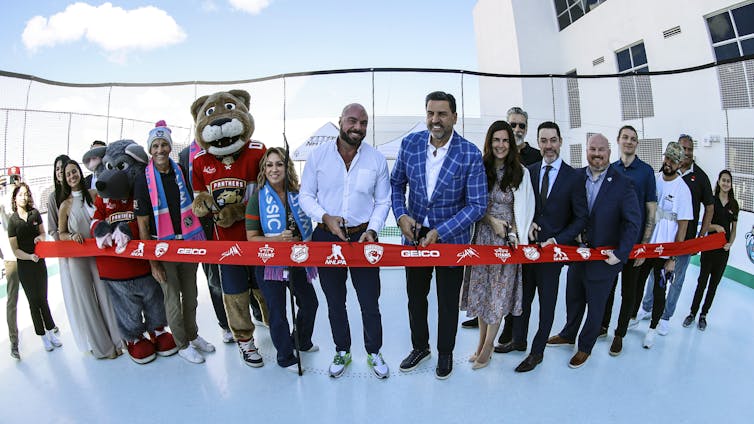
Lauren Hall, Rochester Institute of Technology
When it comes to national politics, Americans are fiercely divided across a range of issues, including gun control, election security and vaccines. It’s not new for Republicans and Democrats to be at odds over issues, but things have reached a point where even the idea of compromising appears to be anathema, making it more difficult to solve thorny problems.
But things are much less heated at the local level. A survey of more than 1,400 local officials by the Carnegie Corporation and CivicPulse found that local governments are “largely insulated from the harshest effects of polarization.” Communities with fewer than 50,000 residents proved especially resilient to partisan dysfunction.
Why this difference? As a political scientist, I believe that lessons from the local level not only open a window onto how polarization works but also the dynamics and tools that can help reduce it.
Problems are more concrete
Local governments deal with concrete issues – sometimes literally, when it comes to paving roads and fixing potholes. In general, cities and counties handle day-to-day functions, such as garbage pickup, running schools and enforcing zoning rules. Addressing tangible needs keeps local leaders’ attention fixed on specific problems that call out for specific solutions, not lengthy ideological debates.
By contrast, a lot of national political conflict in the U.S. involves symbolic issues, such as debates about identity and values on topics such as race, abortion and transgender rights. These battles are often divisive, even more so than purely ideological disagreements, because they can activate tribal differences and prove more resistant to compromise.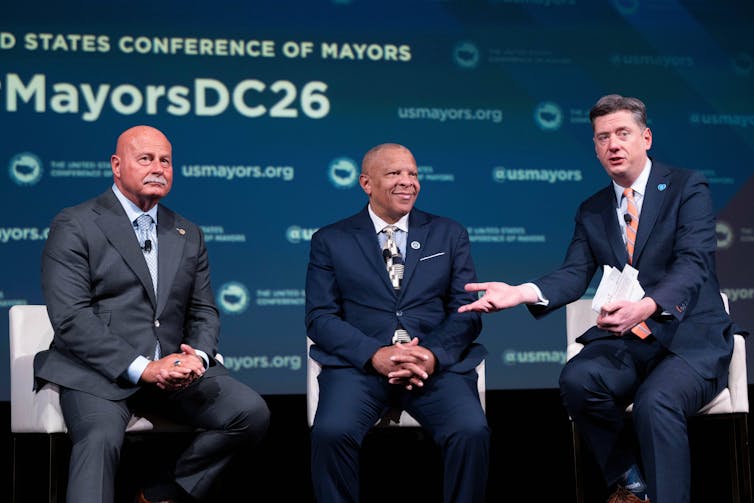
Such arguments at the national level, or on social media, can lead to wildly inaccurate stereotypes about people with opposing views. Today’s partisans often perceive their opponents as far more extreme than they actually are, or they may stereotype them – imagining that all Republicans are wealthy, evangelical culture warriors, for instance, or conversely being convinced that all Democrats are radical urban activists. In terms of ideology, the median members of both parties, in fact, look similar.
These kinds of misperceptions can fuel hostility.
Local officials, however, live among the human beings they represent, whose complexity defies caricature. Living and interacting in the same communities leads to greater recognition of shared interests and values, according to the Carnegie/CivicPulse survey.
Meaningful interaction with others, including partisans of the opposing party, reduces prejudice about them. Local government provides a natural space where identities overlap.
People are complicated
In national U.S. politics today, large groups of individuals are divided not only by party but a variety of other factors, including race, religion, geography and social networks. When these differences align with ideology, political disagreement can feel like an existential threat.
Such differences are not always as pronounced at the local level. A neighbor who disagrees about property taxes could be the coach of your child’s soccer team. Your fellow school board member might share your concerns about curriculum but vote differently in presidential elections.
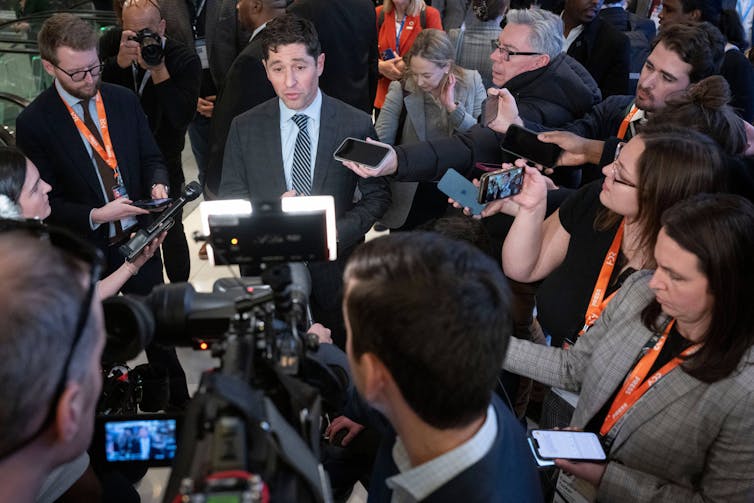
These cross-cutting connections remind us that political opponents are not a monolithic enemy but complex individuals. When people discover they have commonalities outside of politics with others holding opposing views, polarization can decrease significantly.
Finally, most local elections are technically nonpartisan. Keeping party labels off ballots allows voters to judge candidates as individuals and not merely as Republicans or Democrats.
National implications
None of this means local politics are utopian.
Like water, polarization tends to run downhill, from the national level to local contests, particularly in major cities where candidates for mayor and other office are more likely to run as partisans. Local governments also see culture war debates, notably in the area of public school instruction.
Nevertheless, the relative partisan calm of local governance suggests that polarization is not inevitable. It emerges from specific conditions that can be altered.
Polarization might be reduced by creating more opportunities for cross-partisan collaboration around concrete problems. Philanthropists and even states might invest in local journalism that covers pragmatic governance rather than partisan conflict. More cities and counties could adopt changes in election law that would de-emphasize party labels where they add little information for voters.
Aside from structural changes, individual Americans can strive to recognize that their neighbors are not the cardboard cutouts they might imagine when thinking about “the other side.” Instead, Americans can recognize that even political opponents are navigating similar landscapes of community, personal challenges and time constraints, with often similar desires to see their roads paved and their children well educated.
The conditions shaping our interactions matter enormously. If conditions change, perhaps less partisan rancor will be the result.
Lauren Hall, Associate professor of Political Science, Rochester Institute of Technology
This article is republished from The Conversation under a Creative Commons license. Read the original article.
The Bridge is a section of the STM Daily News Blog meant for diversity, offering real news stories about bona fide community efforts to perpetuate a greater good. The purpose of The Bridge is to connect the divides that separate us, fostering understanding and empathy among different groups. By highlighting positive initiatives and inspirational actions, The Bridge aims to create a sense of unity and shared purpose. This section brings to light stories of individuals and organizations working tirelessly to promote inclusivity, equality, and mutual respect. Through these narratives, readers are encouraged to appreciate the richness of diverse perspectives and to participate actively in building stronger, more cohesive communities.
https://stmdailynews.com/the-bridge
Discover more from Daily News
Subscribe to get the latest posts sent to your email.
